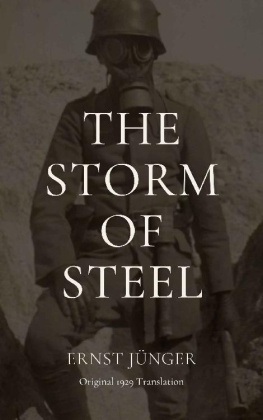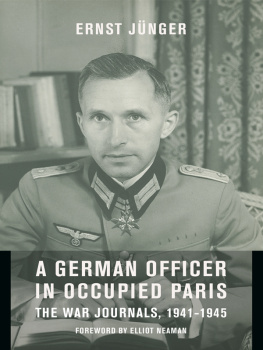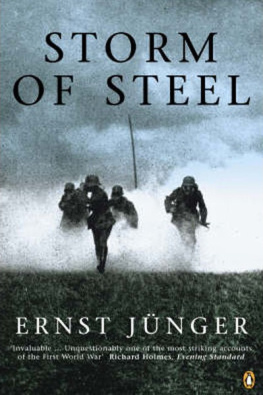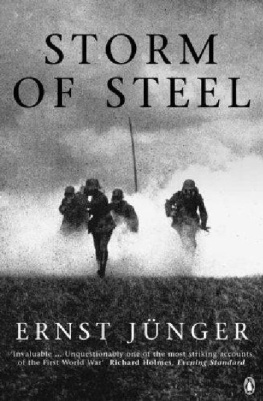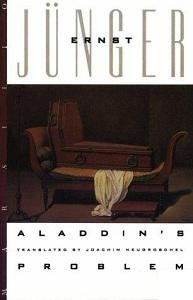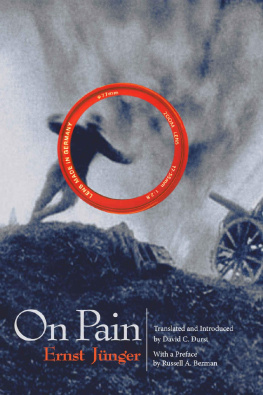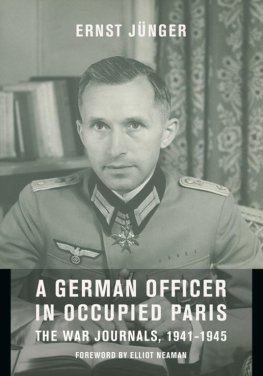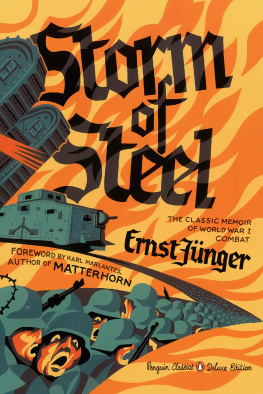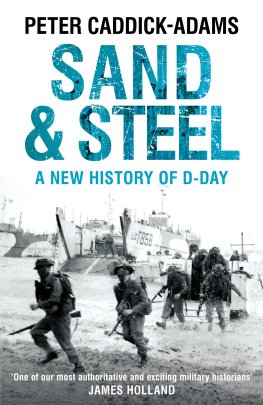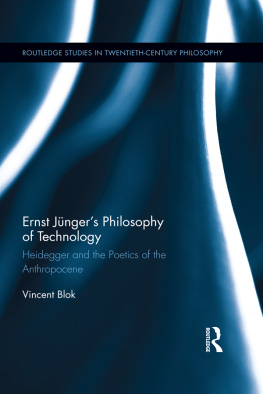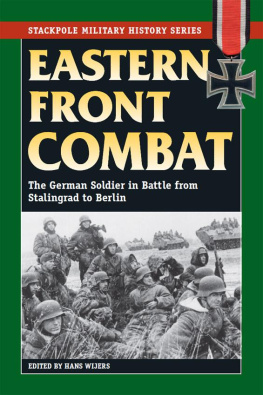The
Storm
of
Steel
Ernst Jnger
Translated by Basil Creighton
Reprint of the 1929 ed. published by Chatto & Windus, London
Copyright Mystery Grove Publishing Co., LLC
All rights reserved.
ISBN: 9781696237727
v. 7
NOTE FROM THE PUBLISHER
Ernst Jngers The Storm of Steel was originally published in 1920, under the title In Storms of Steel: from the diary of a Shock Troop Commander, Ernst Jnger, War Volunteer, and subsequently Lieutenant in the Rifle Regiment of Prince Albrecht of Prussia (73rd Hanoverian Regiment). Although the 1st edition of the book did not sell well, it was notable for being one of the earliest accounts of the war. The text was largely lifted directly from Jngers own unedited wartime diaries. The next major revision came in 1924, when Jnger began working with a new publisher. It is this version that was adapted by Basil Creighton, a world-renowned translator of German literature, into English as The Storm of Steel in 1929. This book is a reprint of that 1929 translation.
Jngers views, and his interpretation of his experiences, changed many times throughout his life. He would complete 7 major revisions of The Storm of Steel, widely-regarded as his masterpiece. The 1929 translation, for decades the only version available in English, has subsequently been overtaken by translations based on later revisions of the book. At this time, the Creighton translation has been out-of-print for decades. Later editions of The Storm of Steel remove many of Jngers reflections on leadership, nationalism, and the nature of heroism. Despite their removal, these passages can still offer readers a wealth of insights, insights that we hope to preserve by republishing this translation both in print and in digital form.
Whenever possible, we have taken efforts to preserve the elements of Creightons original translation. Although subsequent translators have been critical of Creightons work, it remains the most compelling and readable version of The Storm of Steel. For decades, this translation introduced generations of readers to one of Europes greatest writers. We are very happy to allow new generations to enjoy the same experience.
Mystery Grove Publishing Company has many other exciting literary projects in development. You can follow these and more through our Twitter profile: @MysteryGrove
CONTENTS
It is not impossible that among the English readers of this book there may be one who in 1915 or 1916 was in one of those trenches that were woven like a web among the ruins of Monchy-au-Bois. In that case he had opposite him at the time the 73rd Hanoverian Fusiliers, who wear as their distinctive badge a brassard with Gibraltar inscribed on it in gold, in memory of the defence of that fortress under General Elliot; for this, besides Waterloo, has its place in the regiments history.
At the time I refer I was a nineteen-year-old lieutenant in command of a platoon, and my part in the line was easily recognizable from the English side by a row of tall shell-stripped trees that rose from the ruins of Monchy. My left flank was bounded by the sunken road leading to Berles-au-Bois, which was in the hands of the English; my right marked by a sap running out from our lines, one that helped us many a time to make our presence felt by means of bombs and rifle-grenades.
I daresay this reader remembers, too, the white tom-cat, lamed in one foot by a stray bullet, who had his headquarters in No-mans-land. He used often to pay me a visit at night in my dugout. This creature, the sole living being that was on visiting terms with both sides, always made on me an impression of extreme mystery. This charm of mystery which lay over all that belonged to the other side, to that danger zone full of unseen figures, is one of the strongest impressions that the war has left with me. At that time, before the battle of the Somme, which opened a new chapter in the history of the war, the struggle had not taken the grim and mathematical aspect which cast over its landscapes a deeper and deeper gloom. There was more rest for the soldier than in the later years when he was thrown into one murderous battle after another; and so it is that many of those days come back to my memory now with a light on them that is almost peaceful.
In our talks in the trenches, in the dugout, or on the fire-step, we often talked of the Tommy; and, as any genuine soldier will easily understand, we spoke of him very much more respectfully than was commonly the case with the newspapers of those days. There is no one less likely to disparage the lion than the lion-hunter.
Indeed, the landscape in which we lived at the time had something about it of primeval Africa, with two mighty forces of nature locked in conflict there. It was only now and again that one caught the sight of a brownish-yellow fleeting shadow against the desolate countryside that stretched on and on before ones eyes; or heard, after creeping through the wire at night, a whisper or a cough from a post. The distant sound of transport, a cloud of smoke from a fire hidden from view, fresh chalk spoil thrown out on the tortured ground, the monotonous duel of the guns stretching on from week to monththose were the signs that we puzzled over as though they were the runes of a secret book or the spoor of some mighty and unknown beast that came nightly to drink.
As time went on, it grew more and more dangerous to lift a corner of the veil that fell like a magic hood over the spectre that was at once so near and so fatally far off. Raids undertaken to get a glimpse of the enemys lines and some information about what was going on there became less frequent and more exacting as the volume and mass of war material increased. A more and more terrific barrage had to be put down before ten or twenty picked men, armed to the teeth, could make their occasional and exceedingly brief appearances in the opposing trenches. What the survivors brought back with them was the memory of a rapid and frantic glance into Vulcans white hot cauldron.
Still, there were moments of another kind when the deep discord and the even deeper unity of this landscape came more clearly to ones mind. It was strange, for example, to hear at night the cry of the partridges from the waste fields, or at dawn the careless song of the lark as it rose high above the trenches. Did it not seem then that life itself was speaking out of the confidence of its savage and visionary heart, knowing very well that in its more secret and essential depths it had nothing to fear from even the deadliest of wars, and going its way quite unaffected by the superficial interchange of peace and war?
But then, too, did not this life, ruthless towards its creatures, superior to the pain and pleasure of the individual, looking on with indifference while its passive forces were melted down in the crucible of war, enter very clearly even into the soldiers simple mind? Many a time, in that quiet interlude after sunset before the first Verey light went up, this message was brought very near to the soul by the song of an outlying post waiting for the night relief. There was a deeper homesickness there than any peace in this world can set at rest.
Then the fire-step was manned once more, the relief moved off along the communication trenches, and the brisker rifle-fire of the night-time broke out; the ear was again on stretch to catch the pulse-beat of that other life under arms over there in the darkness. And often the Verey lights went up in dozens and the trench got lively when a patrol had crept up to our wire.
To-day there is no secret about what those trenches concealed, and a book such as this may, like a trench-map years after the event, be read with sympathy and interest by the other side. But here not only the blue and red lines of the trenches are shown, but the blood that beat and the life that lay hid in them.
Next page
